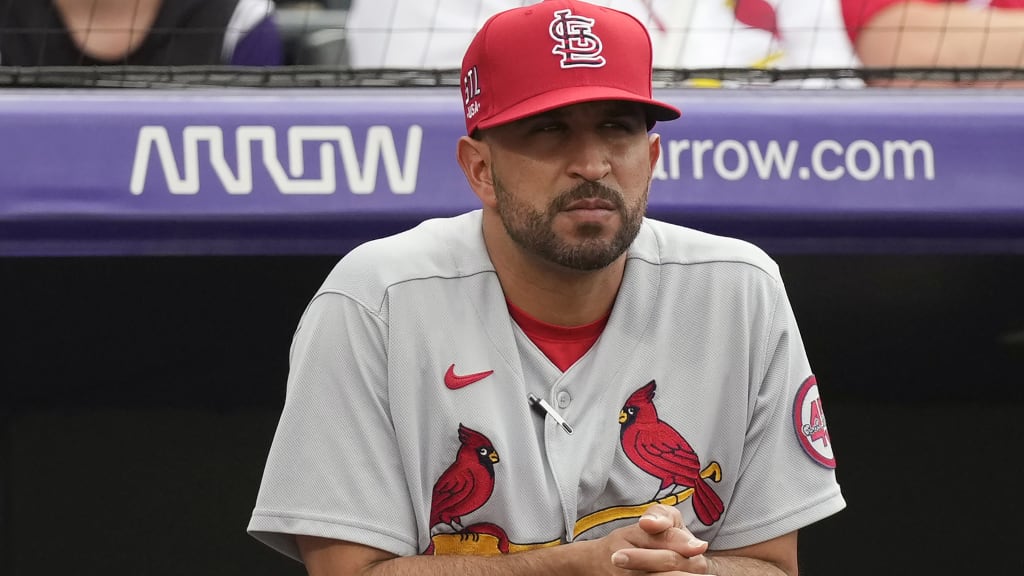
The St. Louis Cardinals have had six managers since 1981. Three of them -- Tony La Russa (1996-2011), Whitey Herzog (1980-90) and Joe Torre (1990-95) -- are all in the Hall of Fame. One of them, Mike Matheny (2012-18), reached the World Series and was back managing in the Majors a year after he was dismissed. One of them, Mike Shildt (2018-21), had a higher winning percentage than any of those previous four. The sixth, Oliver Marmol (who goes by Oli), was just named manager Monday morning. It is both a great job and a terrifying one: History looms over every move you make; it’s always looking over your shoulder.
It’s a lot for even the most experienced manager, but not only is this Marmol’s first managing job, he’s also only 35 years old, making him the youngest manager in the Majors. The Cardinals’ new manager is younger than Corey Kluber, Justin Turner, Mark Melancon, Evan Longoria and Lorenzo Cain.
Marmol is respected among the Cardinals' brass, clearly: When the team unexpectedly dismissed Shildt on Oct. 14, Marmol was widely considered the most likely replacement. But he is far from a sure thing, and there's already a lot on his shoulders. Here are five big questions surrounding Marmol's hiring.
1. Will the players all respect Marmol like they respected Shildt?
Across the board, Cardinals players were reportedly as shocked as the rest of us were when St. Louis fired Shildt. At the end of Matheny’s tenure, the general consensus was that he had lost the clubhouse, particularly the young players. That was not the case with Shildt, who had the players’ trust -- a trust that was vindicated by that 17-game win streak in late September and a near upset of the Dodgers in the Wild Card Game.
Marmol, by most accounts, is also well-regarded among the Cardinals players; it’s surely one of the reasons he got the job. But being manager is a different job than being bench coach, and it’s particularly different when there is a widespread perception -- fair or not -- that the last guy lost his job because he pushed back against the front office. Will players trust Marmol to do the same?
2. Will he be more analytically minded than Shildt?
Compared to Matheny, Shildt’s slight embrace of analytics felt revolutionary: For the first time in a long time, the Cardinals seemed to have a manager who was willing embrace the data side of baseball. But Shildt only seemed like a wonkish manager in comparison to Matheny. The Cardinals in no way resembled the Dodgers, or the Rays, or any of the teams they would love to emulate.
Shildt was a player’s manager: He loved to get starting pitchers wins, he loved to keep playing struggling players to “get them right,” and he was hesitant to regularly platoon. Those might not necessarily have been notable offenses, but clearly the Cardinals would like a manager who will be more apt to platoon, and use openers, and who will be less tied to some of the managerial strategies of the past. Marmol wouldn’t be here if he weren't more open to that. But then again, Shildt wouldn’t have been hired if he hadn’t been more open to that, too.
3. How is Marmol with the press?
La Russa was famously combative with the press, but in a straightforward way: You knew where he stood, even if he was yelling at you, and there was a clear underlying mutual respect. Matheny and the press were constantly at odds, and by the end, there was open hostility. Shildt differed from both of them in that local press adored him and loved his down-home unpretentious nature -- in a way, he seemed like one of them. That didn’t always play well on TV, though. In the words of my Seeing Red podcast co-host Bernie Miklasz, Shildt was prone to “happy talk,” constantly saying everything was fine when fans, who were watching the team struggle, clearly knew otherwise. One of the primary jobs of a manager is to be the public face of the team. Is Marmol ready for that part of the job? Only time will tell.
4. Will he have enough influence to push for changes?
Many reports claimed Cardinals brass blanched when Shildt (understandably, one might argue) criticized the club in June for not having enough pitching options for him to use. What was most surprising about Shildt’s dismissal, if those reports are true, is that Shildt was originally thought of as a very management-friendly hire. If he didn’t have the juice to push back on the front office, who would be able to? While managers are certainly conduits for the front office, players still need to feel their manager has their back. If the team wants help from the front office, will Marmol be able to be the vessel for their requests?
5. How short will his learning curve be?
Every manager has a learning curve: La Russa says he had a huge one when he first took over in Chicago in 1979, at roughly the same age Marmol is taking the reins in St. Louis. But the Cardinals are trying to win a World Series with this team, just like they are every year. Marmol is not stepping into a rebuilding situation where there's a bit of leeway to make some mistakes. He’s in charge of a team and a franchise where October baseball is an expectation. It’s a huge job. Is he ready? We will soon find out.


